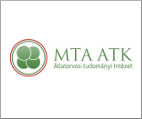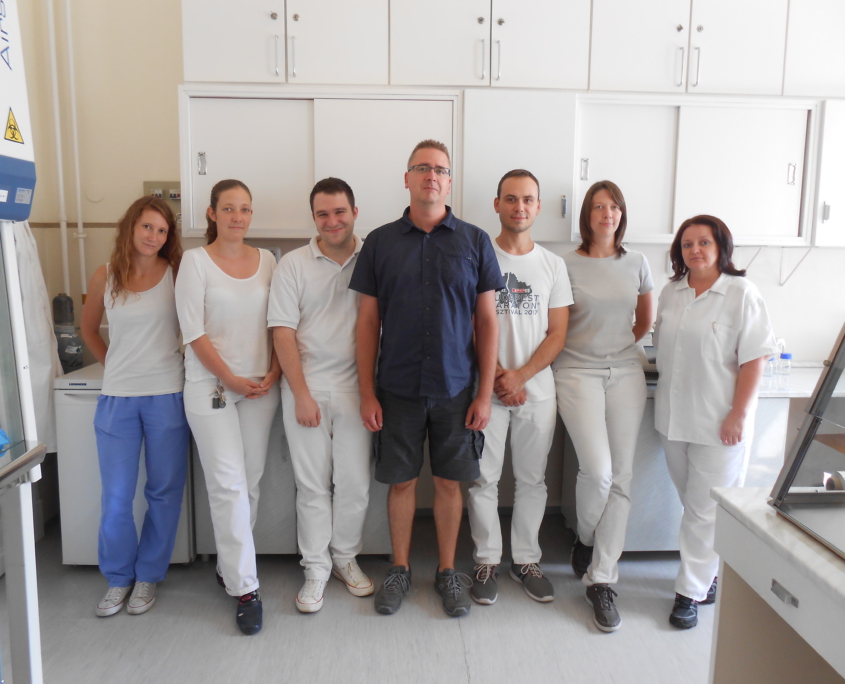
Mycoplasmology Research Group
Institute for Veterinary Medical Research – Centre for Agricultural Research – Hungarian Academy of Sciences
The Institute for Veterinary Medical Research is the only principal-occupation research institution of Hungarian veterinary science. Mycoplasmosis research has been performed in our institution since the 1970’s. We focus on livestock (avian, porcine, ruminants), companion animal and wildlife mycoplasmosis. Beside basic and applied research projects our responsibilities include preparation of the results for use in the practice and provision of diagnostic service. The researchers of the group take a prominent part in postgraduate (PhD) training and in the continuing education of veterinarians.
Scientific areas
Avian mycoplasmosis
The focal points of our research are the following:
- Development of molecular methods for the genetic characterization and the molecular epidemiology purposes of synoviae and M. gallisepticum.
- Development of molecular assays in order to differentiate M. synoviae and M. gallisepticum wild-type and vaccine (MS-H, MS1, ts11, 6/85, F, K) strains.
- Determination of virulence factors in M. synoviae and M. gallisepticum using targeted gene disruption.
- Determination of the most effective antimicrobial drugs against synoviae, M. gallisepticum and waterfowl Mycoplasma species (M. sp. 1220, M. anatis, M. anseris) by a microbroth dilution method in the case of antibiotics commonly used in veterinary practice.
- Determination of the genomic regions and mutations related to antibiotic resistance in synoviae and M. sp. 1220 and the development of molecular assays for their detection. Besides nucleotide mutations, the presence and role of extracellular vesicles, efflux mechanisms and biofilm formation are also studied.
- De novo whole-genome sequencing of Mycoplasma 1220, M. anatis, M. anseris, and M. cloacale.
- Development of species-specific polymerase chain reactions for the detection and differentiation of Mycoplasma 1220, M. anseris, M. anatis and M. cloacale.
- sp. 1220 vaccine development.
Further readings
Kreizinger Zs, Grózner D, Sulyok KM, Nilsson K, Hrivnák V, Bencina D, Gyuranecz M. (2017): Antibiotic susceptibility profiles of Mycoplasma synoviae strains originating from Central and Eastern Europe. BMC Veterinary Research, 13: 342. doi: 10.1186/s12917-017-1266-2
Kreizinger Zs, Sulyok KM, Grózner D, Bekö K, Dán Á, Szabó Z, Gyuranecz M. (2017): Development of mismatch amplification mutation assays for the differentiation of MS1 vaccine strain from wild-type Mycoplasma synoviae and MS-H vaccine strains. PLoS ONE 12(4): e0175969. doi: 10.1371/journal.pone.0175969
Grózner D, Kreizinger Zs, Sulyok KM, Rónai Zs, Hrivnák V, Turcsányi I, Jánosi Sz, Gyuranecz M. (2016): Antibiotic susceptibility profiles of Mycoplasma sp. 1220 strains isolated from geese in Hungary. BMC Veterinary Research. 12: 170. doi: 10.1186/s12917-016-0799-0
Kreizinger Zs, Sulyok KM, Pásztor A, Erdélyi K, Felde O, Povazsán J, Körösi L, Gyuranecz M. (2015): Rapid, simple and cost-effective molecular method to differentiate the temperature sensitive (ts+) MS-H vaccine strain and wild-type Mycoplasma synoviae isolates. PLoS ONE 10(7): e0133554. doi: 10.1371/journal.pone.0133554
Ruminant mycoplasmosis
The focal points of our research are the following:
- Genetic characterization of the bovis strains with the multi-locus sequence typing (MLST) and multi-locus variable-number tandem-repeat analysis (MLVA) methods.
- Determination of the in vitro susceptibility profiles of the bovis isolates.
- Investigation of the molecular mechanisms involved in the resistance of bovis and identification mutations responsible for the high MICs to seven different antimicrobial families (fluoroquinolones, tetracyclines, aminocyclitol, macrolides, lincosamide, phenicol and pleuromutilins).
- Development and characterization of rapid and cost-effective real-time PCR based assays for the simultaneous determination of antibiotic susceptibility profile of bovis isolates in the case of seven antimicrobial groups.
Further readings
Sulyok KM, Bekö K, Kreizinger Zs, Wehmann E, Jerzsele Á, Rónai Zs, Turcsányi I, Makrai L, Szeredi L, Jánosi Sz, Nagy SA, Gyuranecz M. (2018): Development of molecular methods for the rapid detection of antibiotic susceptibility of Mycoplasma bovis. Veterinary Microbiology, 213: 47-57. doi: 10.1016/j.vetmic.2017.11.026
Sulyok KM, Kreizinger Zs, Wehmann E, Lysnyansky I, Bányai K, Marton Sz, Jerzsele Á, Rónai Zs, Turcsányi I, Makrai L, Jánosi Sz, Nagy SÁ, Gyuranecz M. (2017): Mutations associated with decreased susceptibility to seven antimicrobial families in field and laboratory-derived Mycoplasma bovis strains. Antimicrobial Agents and Chemotherapy, 61(2): e01983-16. doi: 10.1128/AAC.01983-16
Sulyok KM, Kreizinger Zs, Fekete L, Hrivnák V, Magyar T, Jánosi Sz, Schweitzer N, Turcsányi I, Makrai L, Erdélyi K, Gyuranecz M. (2014): Antibiotic susceptibility profiles of Mycoplasma bovis strains isolated from cattle in Hungary, Central Europe. BMC Veterinary Research, 10: 256. doi: 10.1186/s12917-014-0256-x
Sulyok KM, Kreizinger Zs, Fekete L, Jánosi Sz, Schweitzer N, Turcsányi I, Makrai L, Erdélyi K, Gyuranecz M. (2014): Phylogeny of Mycoplasma bovis isolates from Hungary based on multi locus sequence typing and multiple-locus variable-number tandem repeat analysis. BMC Veterinary Research, 10: 108. doi: 10.1186/1746-6148-10-108
Porcine mycoplasmosis
The focal points of our research are the following:
- Genotyping of hyopneumoniae and M. hyorhinis strains with MLST and MLVA.
- Minimum inhibitory concentration determinations for fifteen antibiotics of eight antimicrobial families against hyopneumoniae and M. hyorhinis in order to find the most effective antibiotic agents against these bacteria in vitro.
- Evaluation of immunological markers after hyopneumoniae vaccination and/or infection.
Further readings
Felde O, Kreizinger Zs, Sulyok KM, Marton Sz, Bányai K, Korbuly K, Kiss K, Biksi I, Gyuranecz M.(2018): Genotyping Mycoplasma hyopneumoniae isolates based on multi-locus sequence typing, multiple-locus variable-number tandem repeat analysis and analysing gene p146. Veterinary Microbiology, 222: 85-90. doi: 10.1016/j.vetmic.2018.07.004
Group leaders
Miklós GYURANECZ, DVM, PhD
Lab members
Zsuzsa KREIZINGER, DVM, PhD
Kinga M. SULYOK, MSc, PhD
Orsolya FELDE, MSc, PhD student
Dénes GRÓZNER, MSc, PhD student
Katinka BEKÖ, DVM, PhD student
Áron B. KOVÁCS, MSc
Veronika HRIVNÁK, technician
Contact
Address
Institute for Veterinary Medical Research
Centre for Agricultural Research
Hungarian Academy of Sciences
Hungária körút 21.
Budapest
1143
Hungary

